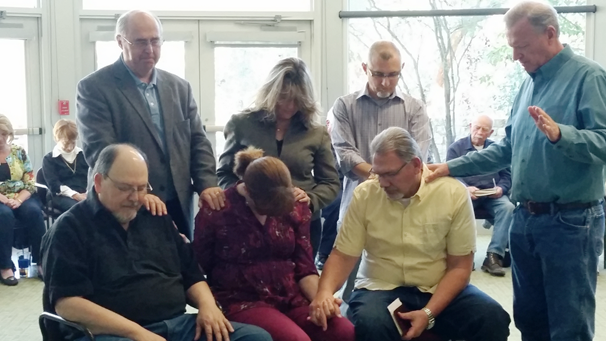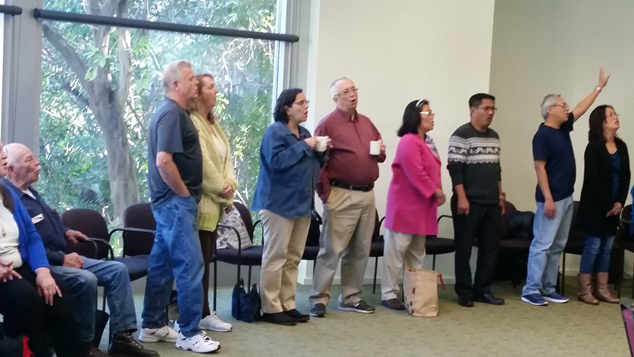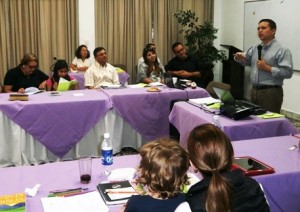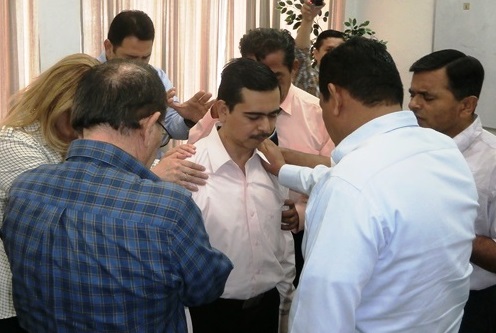Dear Brothers and Sisters in Christ,
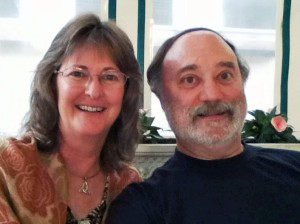 I find it amusing when people exclaim, “If I can’t see it, I won’t believe it.” I often hear this said when people express doubt that God exists or that he includes all people in his grace and mercy. Seeking not to cause offense, I point out that we don’t see magnetism or electricity, yet we know they exist by their effects. The same is true with wind, gravity, sound and even thought. In all these ways we experience what is called “imageless knowing.” I like to refer to such knowing as invisible visibility.
I find it amusing when people exclaim, “If I can’t see it, I won’t believe it.” I often hear this said when people express doubt that God exists or that he includes all people in his grace and mercy. Seeking not to cause offense, I point out that we don’t see magnetism or electricity, yet we know they exist by their effects. The same is true with wind, gravity, sound and even thought. In all these ways we experience what is called “imageless knowing.” I like to refer to such knowing as invisible visibility.

For years we could only speculate about what was in the skies, relying on unaided eyesight. Today with the help of telescopes (like the Hubble Telescope), we know much more. What once was to us “invisible” is now visible. Yet not everything that exists is visible. Dark matter emits no light or heat—it’s invisible to our telescopes. Yet scientists know that dark matter exists because they have detected its gravitational effects. A quark is a tiny theoretical particle that makes up protons and neutrons in the nucleus of atoms. Along with gluons, quarks also make up more exotic hadrons such as mesons. Though none of these sub-atomic particles has been observed, scientists have detected their effects.
There is no microscope or telescope by which God can be seen, for as Scripture tells us, God is invisible: “No one has ever seen God, but the one and only Son, who is himself God and is in closest relationship with the Father, has made him known” (John 1:18). There is no way to “prove” the existence of God using physical instruments. Yet we believe God exists because we have experienced the effects of his unconditional, outgoing love. That love, of course, is most personally, intensively and concretely revealed in Jesus Christ. In Jesus, we see what his apostles concluded: God is love.
Love, which itself cannot be seen, is God’s nature, motivation and purpose. As T. F. Torrance puts it: “The constant and ceaseless out-flow of the Love of God which has no other reason for its movement than the Love that God is, is therefore [poured out] entirely without respect of persons and irrespective of their reactions” (Christian Theology and Scientific Culture, p. 84). God loves because of who he is, not because of who we are or what we do. And that love is manifested to us in God’s grace.
While we cannot fully explain the invisible—like love or grace—we know it exists because of what we partially see. Note I use the word partially. We don’t want to fall into the trap of assuming the visible explains the invisible. T. F. Torrance, who studied theology and science, postulates the opposite to be true; the invisible explains the visible. To make his point, he uses the parable of the workers in the vineyard (Matthew 20:1-16), where the vineyard owner hires workers throughout the day to work in the fields. At the end of the day, each worker gets paid the same even though some worked hard the whole day and others only worked a couple of hours. For most common laborers, this seems unfair. How could someone who only works an hour get the same wage as someone working all day?
Torrance points out that fundamentalist and liberal exegetes miss the point of Jesus’ parable, which is not about wages and fairness but about God’s grace, which is unconditional, generous and powerfully transforming. This grace is not based on how long we’ve worked, how long we’ve believed, how much we’ve studied, or how obedient we’ve been. God’s grace is based entirely on who God is. By giving this parable, Jesus makes “visible” the “invisible” nature of the God of grace who sees and does things quite differently than we. God’s kingdom is not about how much we earn—it’s about God’s lavish generosity.
Jesus’ parable tells us that God offers his amazing grace to all. And while all are offered the gift in the same measure, some choose to live in the reality of that gift sooner and thus may have opportunity to enjoy it longer than those who have not made that choice. The gift of grace is the same for all; what each person does with it varies widely. It is when we live in grace that what had been invisible to us becomes visible.
The invisibility of God’s grace does not make it any less real. God gave himself to us, in person, so that we can know and love him—so that we can feel his forgiveness and enter into a relationship with him as Father, Son and Spirit. We live by faith and not by sight. We have experienced his will in our lives—in our thoughts and actions. We know God is love because we know who he is in Jesus Christ, who “has made him known” (John 1:18). We feel the power of God’s grace as we come to know that his purpose is to forgive and to love us—to give us the amazing gift of his grace. As Paul says, “For it is God who works in you to will and to act in order to fulfill his good purpose” (Philippians 2:13).
Living in his grace,
Joseph Tkach

